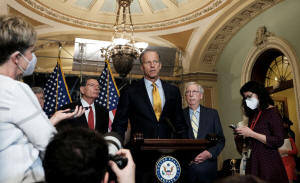U.S. Senate Republicans block bill to battle white supremacy
 Send a link to a friend
Send a link to a friend
 [May 27, 2022] By
David Morgan [May 27, 2022] By
David Morgan
WASHINGTON (Reuters) -U.S. Senate
Republicans on Thursday blocked debate on a bill that represented the
first effort by Congress to address mass shootings since a white
supremacist's killing of 10 Black people in New York and a gunman's
massacre of 19 pupils and two teachers in Texas.
The 47-47 vote along strict party lines fell short of the 60 yes votes
required to launch debate in the 100-member Senate on a bill titled the
Domestic Terrorism Prevention Act.
The vote effectively blocked the bill which would have authorized
federal agencies to monitor and report jointly on domestic terrorism
within the United States, including incidents related to white
supremacy.
Republicans said the legislation was unnecessary as Democratic President
Joe Biden already had the authority to organize his administration's
response to violent extremism.
Democrats said the bill was needed to bolster the federal government's
response to rising incidents of violent extremism. They said amendments
to any such bill could address potential restrictions on guns.

Mass shootings in recent years have provoked discussion in Congress on
what to do about gun violence but little action as the two parties are
deeply divided on gun restrictions.
Americans have little confidence in Congress' ability to solve the
problem, with a Reuters/Ipsos poll on Tuesday showing that just 35%
believe lawmakers will act.
The House of Representatives passed the domestic terrorism bill along
party lines last week, after an avowed white supremacist killed the 10
Black people in a livestreamed shooting at a supermarket in Buffalo, New
York, on May 14.
On Tuesday, a gunman stormed a school in Uvalde, Texas, and killed the
9- and 10-year-old children and two teachers.
Senate Democrats and some Republicans have discussed the possibility of
bipartisan legislation to address mass shootings, including proposals to
expand background checks for gun purchasers and to keep guns out of the
hands of the mentally ill.
[to top of second column]
|

U.S. Senator John Thune (R-SD) speaks to reporters following the
Senate Republicans weekly policy lunch at the U.S. Capitol in
Washington, U.S., May 3, 2022. REUTERS/Michael McCoy

Some 79% of Americans - including 78% of Republicans
- are more likely to vote for a candidate in November's
congressional election who supports passing red flag laws of that
kind, the Reuters/Ipsos poll found.
Senate Majority Leader Chuck Schumer said that at least five
Democratic lawmakers including Senator Chris Murphy have reached out
to Republicans about possible measures related to gun and school
safety.
Murphy, a leading advocate for gun restrictions, told a news
conference that talks with Republicans were expected on Thursday and
would continue through next week. But the odds are slim at best that
the Senate will enact any bill to restrict guns.
"None of us are under any illusions that this will be easy," Schumer
said on the Senate floor, accusing Republicans of being in the "vice
grip" of the U.S. gun lobby. But he added: "We need to give it a
short amount of time to try."
Schumer's Republican counterpart, Minority Leader Mitch McConnell,
told reporters that any proposal capable of passing the Senate would
need to be limited to address "the facts" of the Texas massacre. He
did not elaborate but Republicans broadly oppose new gun
restrictions that would infringe on the rights of law-abiding gun
owners.
Other Republicans expressed potential interest in red-flag
legislation that would encourage states to deny firearms to anyone
found mentally unstable or dangerous, possibly using unspent
COVID-19 funding to pay for the initiative.
With the 100-seat Senate split 50-50, gun legislation would need 10
Republican votes to meet the chamber's 60-vote threshold for passing
most bills.
(Reporting by David Morgan; Additional reporting by Richard Cowan;
Editing by Scott Malone and Howard Goller)
[© 2022 Thomson Reuters. All rights
reserved.]
This material may not be published,
broadcast, rewritten or redistributed.
Thompson Reuters is solely responsible for this content.
 |